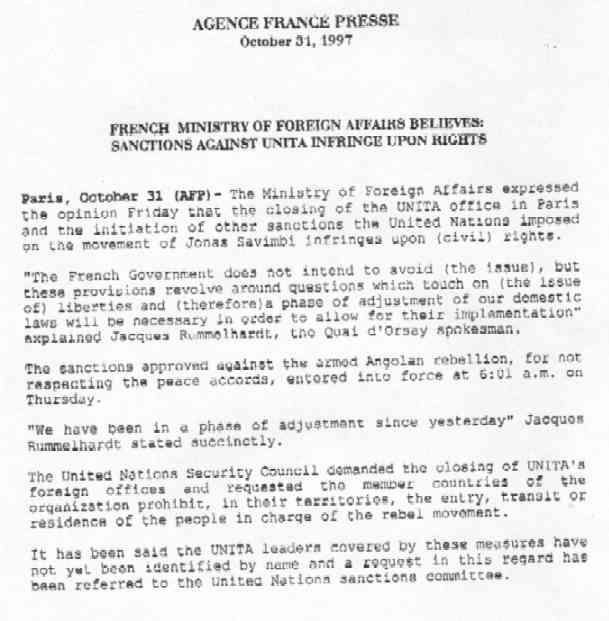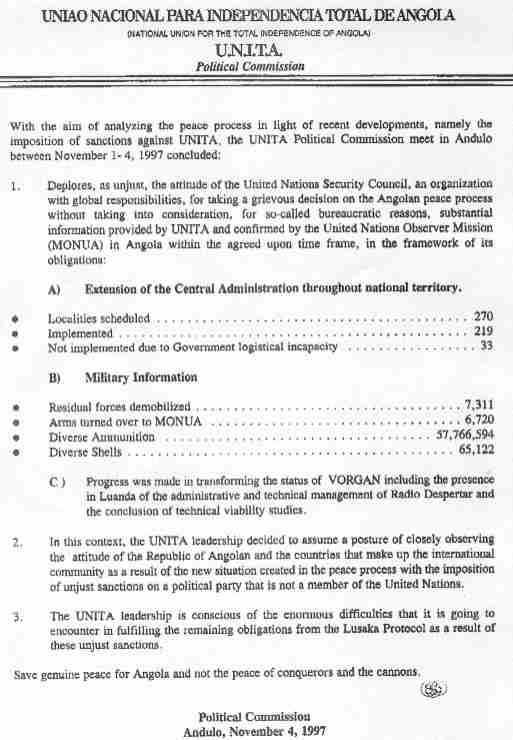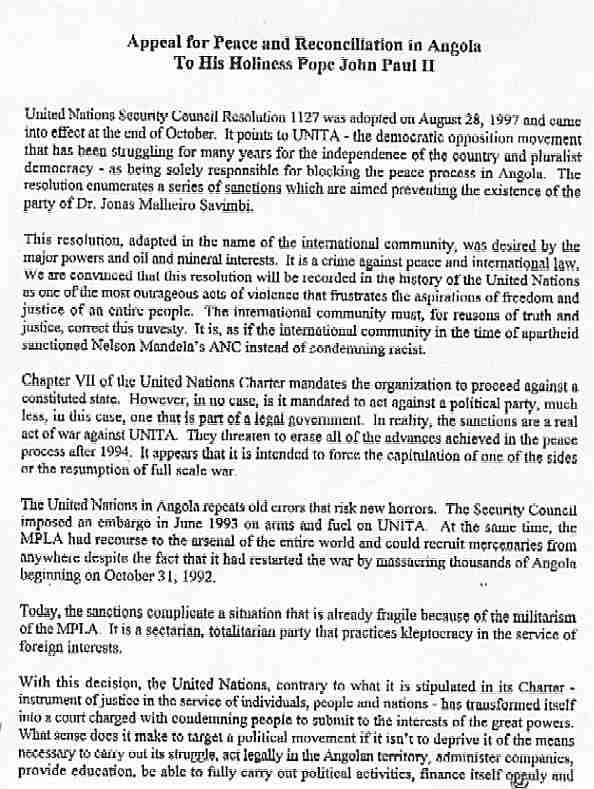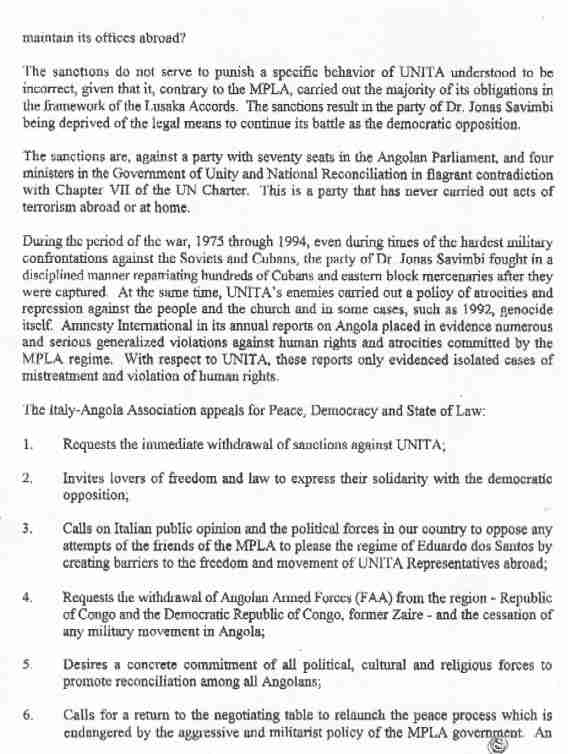 KWACHA UNITA PRESS
KWACHA UNITA PRESS KWACHA UNITA PRESS
KWACHA UNITA PRESSLatest News (14th. November 1997)
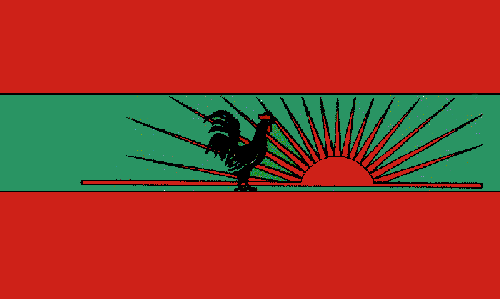
FIFTH ANNIVERSARY OF LUANDA MASSACRES, CEDA CALLA FOR PROFOUND REFLECTION.
FRENCH MINISTRY OF FOREIGN AFFAIRS BELIEVES SANCTIONS AGAINST UNITA INFRINGE UPON RIGHTS.
U.N.I.T.A. POLITICAL COMMISSION DEPLORES UNJUST ATTITUDE OF UNITED NATIONS SECURITY COUNCIL.
APPEAL FOR PEACE AND RECONCILIATION IN ANGOLA TO HIS HOLINESS POPE JOHN PAUL II.
COMMITTEE ON FOREIGN RELATIONS
Washington, DC 20510-6225
October 29, 1997
The Honourable Madeleine Albright
Secretary
U.S. Department of State
2201 "C" Street N.W.
Washington, D.C. 20520
Dear Madam Secretary,
I am greatly concerned, as are many others, about the tepid U.S. response to the Angolan military intervention in the overthrow of the democratically-elected government of Pascal Lissouba of the Republic of Congo.
On October 16, the government of Angola provided direct tactical assistance, including air-power, armoured vehicles and as many as 3,000 troops, to the rebel forces of Denis Sassou-Nguesso (known as the "Cobra militia"). This intervention was obviously intended to be a strategic assault on UNITA, as the Republic of Congo had become a key resupply route for UNITA.
I am disappointed that such blatant disregard for international law was not clearly condemned in the strongest possible terms by the U.S. government. (I was also puzzled by the U.N. Security Council resolution making reference to the intervention of foreign forces in Congo, but not even mentioning the government of Angola.)
The Lusaka Protocol requires the Government of Angola to inform its National Assembly and the United Nations Observer Mission in Angola of any troop movements. The National Assembly and the U.N. Mission were not informed of the MPLA invasion of the Republic of Congo, and was therefore a clear and undeniable violation of the letter and spirit of the Lusaka Protocol -- in addition to being direct violation of the United Nations Charter.
The international community has applied considerable pressure on UNITA, including the threat of renewed sanctions, in an attempt to ensure its compliance with the Lusaka Protocol. Yet, the Angolan government’s blatant and severe violation of Lusaka has been met with virtual silence by the United States.
The actions by the government of Angola, and the response of the international community to the actions, are not at all persuasive that the MPLA intends to abide by the Protocol. Sanctions against UNITA are to go into effect October 30, 1997. However, the MPLA’s aggression has poisoned the atmosphere inside Angola, making the achievement of UNITA’s compliance by this deadline difficult, if not impossible. UNITA should abide by the Lusaka Protocol, continue the demobilisation of its forces, and return sensitive areas to central authority.
The MPLA government should also be held to the same standard. Are not sanctions against the government of Angola completely warranted, and should not the United States and the U.N. Security Council revise their position to reflect the MPLA’s illegal action?
The imposition of sanctions on UNITA at this time is counterproductive. The United States must develop a coherent policy on Angola that takes into consideration the government of Angola’s flagrant violation of international law and the Lusaka Protocol. I certainly hope that this latest aggression puts to rest any thoughts of a U.S. - Angolan military relationship.
Sincerely,
JESSE HELMS
Bill Richardson Went to Bailundo Without Informing Luanda
October 27, 1997
Luanda, 27 Oct. (lusa) - The U.S. Representative at the United Nations, Bill Richardson, visited Jonas Savimbi in Bailundo on Sunday without previously informing Luanda, provoking the displeasure of the Angolan Government, a diplomatic source told LUSA today. According to the same informant, the Angolan Ministry of Foreign Affairs will summon the U.S. Ambassador in the coming days to communicate its displeasure for what took place.
"It was another act of pure arrogance by the Americans" emphasised a source contacted by LUSA who classified the attitude of Bill Richardson as like "someone who entered in a house by the window".
Bill Richardson, who arrived in Luanda on Sunday at approximately 9:00 a.m. (8:00 Lisbon time) - allegedly coming from Kinshasa - said to the press that he soon proceed to Andulo in Bie Province for discussions with Jonas Savimbi, but he had already, after all, spoken with the UNITA leader in Bailundo, Huambo Province.
This change in the travel plan irritated the Angolan authorities, with President Jose Eduardo dos Santos alleging that he did not officially know of the presence of Richardson in Angola, in view of which he delegated his Minister of Foreign Relations the task of receiving him.
The U.S. diplomat - who was accompanied on this trip to Angola by Congressman Donald Payne, a specialist in African affairs, and Howard Wolpe, President Bill Clinton’s special envoy to the Great Lakes region - held a working meeting in Luanda with Alioune Blondin Beye, the Mediator of the Angolan peace process.
Faced with ‘the situation created’ that could, inclusively, have had fatal consequences for security reasons - given the overflight of Angolan territory by an unidentified aircraft - the U.S. Ambassador in Angola Donald Steinberg "is going to be summoned to the Ministry of Foreign Affairs in the next few days to be made aware" of the displeasure of the Angolan authorities, an Angolan diplomatic source told the LUSA news agency.
A U.S. diplomatic source refused to comment on what took place and maintained the original version, despite admitting that "we are dealing with a delicate matter, that is worthwhile addressing".
THE CENTRE FOR DEMOCRACY IN ANGOLA, INC. NEWS
P.O. Box 65463 · Washington, DC 20035-5463 · (202) 775-0958
PRESIDENT DOS SANTOS BREAKS AGREEMENT,
INCREASING SIGNS OF GOVT. MILITARY PREPARATIONS
Washington, D.C., October 28, 1997 - The Angolan Government military intervention in the Republic of the Congo, that resulted in the overthrow of the democratically elected Lissouba Government, has created a mind-set in the Angolan Government that is severely compromising the implementation of the Lusaka Protocol. The Angolan President Jose Eduardo dos Santos unilaterally broke an agreement with UNITA on his upcoming meeting with Dr. Jonas Malheiro Savimbi during a press conference following a summit meeting in Luanda attended by Presidents Omar Bongo of Gabon and Laurent Kabila of the Democratic Republic of Congo, and Denis Sassou-Nguesso of the Republic of Congo. Mr. dos Santos announced, "We are expecting a meeting (with Dr. Savimbi) during the month of November in Luanda, and it is the only place I will meet" according to an October 27 Reuters report. The Government had previously agreed that the meeting would be held in the last ten days of October outside the capital.
The Angolan head of state also indicated that he was now disregarding the Mediation and good offices of the United Nations and the international community. He said, "We are ready for this meeting and we are not going to meet because of pressure from the U.S., Troika or international community. We will have the meeting when we think that it will be useful for the resolution of national problems", according to an October 27 Angolan News Agency (ANGOP) report. The Angolan President had assured the United Nations Secretary General, Kofi Annan that he would meet with the UNITA President in July when he returned from a vacation trip to Italy. Dos Santos recently snubbed Bill Richardson, the U.S. Ambassador to the United Nations, who arrived in Angola on October 26, by refusing to meet with him.
According to the October 27 New York Times, Ambassador Richardson threatened a cut-off of U.S. aid if Angola did not withdraw the 3,500 troops and equipment, including tanks and MIG-23 aircraft piloted by South African mercenaries, that was decisive in putting Sassou-Nguesso in power. Dos Santos told a press conference, "The Angolan troops will be withdrawn when the situation is more stable". The United Nations, the U.S. and the Organisation of African Unity have all called for the withdrawal of the Angolan troops.
There are clear indications that the summit was an attempt by the Angolan Government to rally support for a joint regional military attack against UNITA. The Reuters correspondent in Luanda reported on October 27 that a western security analyst said, "The Angolans (government) want a decisive military move against UNITA. It has the potential of igniting a regional war". The Government has been moving large numbers of troops and substantial amounts of material inside Angola in recent weeks in violation of the peace accords.
UNITA continues to turn over materiel to the United Nations Observer Mission in Angola. They include 55 million rounds of ammunition and 125 heavy weapons with 2,600 shells. More than 5,450 residual troops have been registered by United Nations monitors in preparation for demobilisation.
For further information, call:
202-775-0958
UNIAO NACIONAL PARA INDEPENDENCIA TOTAL DE ANGOLA
(NATIONAL UNION FOR THE TOTAL INDEPENDENCE OF ANGOLA)
U.N.I.T.A.
The UNITA External Mission met in Paris on October 24, 1997 on the occasion of the publication of a book of interviews with the UNITA President, Dr. Jonas Malheiro Savimbi, conducted by Dr. Atsutse Kokouvi Agbobli, the well-known Togolese political figure, journalist and historian. Following a review of recent developments in the Angolan political situation and the sub-region, the External Mission:
Took note of the recognition by the United Nations Secretary General, in his report, No. 5/97/807 of October 17, 1997, of UNITA’s decisive contribution to the peace process. Nevertheless, we are astonished that the Secretary General has silently passed over the serious failures of the MPLA Government relative to its obligations under the terms of the Lusaka Protocol.
Expresses its deep dismay in reference to the military intervention of Angolan forces in the Congo without the United Nations energetically denouncing the violation of the Lusaka Protocol and the United Nations Charter that this adventurous, destabilising initiative represents. We recall that, in conformity with the peace accords, no movement of troops can be made without informing the United Nations Observer Mission in Angola (MONUA) and that, in the internal political sphere, all engagements of the country in war should be under the authority of the appropriate organ of sovereignty, the National Assembly.
On the same note, the External Mission unanimously endorses the last communiqué of the UNITA Political Commission dated October 18, 1997.
Denounces the policy of punitive measures against UNITA in spite of its consensual efforts and political will to achieve peace. The External Mission reiterates that this burden that hangs over the peace process could have negative consequences rather than those anticipated. Genuine confidence building between the two sides is dependent on stability and harmony.
PARIS
OCTOBER 24, 1997
Govt. Aggression Endangers Angolan Peace Process
October 23, 1997
The Centre for Democracy in
Angola, Inc.
1629 K Street, NW
Suite 503
Washington, DC 20006
Cuango River Basin was supposed to be garrisoned by 200 Government Police per the agreement reached with between representatives of the Government and UNITA. Less than one week later, thousands of troops descended on the area.
GOVERNMENT DISREGARDS UNITED NATIONS
The Government is obligated to inform the United Nations Mission in advance of any troop movements under the terms of the Lusaka Protocol. It is also required to confine FAA troops to the barracks. The UN Mission was not informed of the FAA troop movement which passed through Mona Quimbundu, Cacolo and Xinge. The United Nations only responded when UNITA lodged and energetic protest. When General Sibinda, the United Nations chief military observer, was dispatched to the area, the FAA troops refused to stop.
The FAA troops finally pulled back a short distance from Cuango to Capenda Camulemba at the insistence of the United Nations. Nevertheless, they were not pulled back to their starting point. They are in a tactical position to attack areas still administered by UNITA.
MORE GOVT. MILITARY AGGRESSION
The Government armed forces have also been using armed violence and terror tactics to undermine the peace process in other parts of the country. It has targeted areas of Benguela, southern Huambo and Huila provinces where the Government has re-established its administration with ironically, the co-operation of UNITA. The modus operandi in these operations is to attack local UNITA political committees and eliminate local UNITA political leaders. This creates insecurity and tells the population, in no uncertain terms, that support for UNITA will be costly, even to the point of losing one’s life. Government soldiers are supposed to be in barracks, and the militia disarmed under the provisions of the Lusaka Protocol. The blatant political message is that UNITA can’t protect its civilian supporters, therefore, it isn’t smart to support UNITA.
PATTERN OF ATTACKS
Government attacks over a one-week period against UNITA administrated areas listed below are just examples of the policy of unprovoked FAA aggression intended to derail the peace process. This is by no means an exhausted list. The ruling MPLA takes the international community’s lack of firmness in responding to attacks as licence for more aggression.
October 2 - FAA forces based in Longonjo, Huambo Province occupied the Bongo Protestant Mission. They tore down the UNITA flags and posters from the local party headquarters and replaced them with MPLA symbols. (The old socialist national symbols remain unchanged.) The civilian population and the local party leaders fled and took refuge in the forest.
October 3 - FAA units, who occupied Bongo Mission the day before, marched on Kassema, 18 miles from Yava Katabola, and occupied it.
October 4 - MPLA civilian militia, illegal under the terms of the Lusaka Protocol, from Kusse attacked the village of Samessele.
October 5 - FAA forces based in Yambala and Fazenda Londungo in Benguela Province launched armed attacks against the villages of Chitau, Chendamoko, Akarangalo and Kalilongue, in the Kasseke Commune area. They stole 200 head of cattle.
October 5 - FAA forces in Kaluquembe, Huila Province attacked the villages of Gandu, Kassipera and Susangue. Two civilians were murdered. Thirty-five head of cattle were stolen and 10 granaries were destroyed.
October 6 - A MPLA militia unit from Kusse, Huila Province attacked the Nima area and burned down the houses of civilians.
October 6 - FAA forces from Chongoroi, Benguela Province, totalling 155 men, attacked Chimuine, the UNITA political headquarters in the area. They where equipped with assault rifles 60 mm mortars and supported by a helicopter gun-ship. Two civilians were killed and one wounded. Seventy homes and 40 granarics were burned down. Fifty sheep and 262 head of cattle were stolen. The helicopter gun-ship was seen by the MONUA observation team based in Chikuma.
October 8 - MPLA militia forces from Kusse attacked Nima again. They burned down the houses that the population had begun to rebuild.
FOREIGN AGGRESSION/SHADOWY GOVT.
"Now this week in a startling fashion, Angola has decided the outcome of the five-month civil war sending tanks and fighter planes to intervene on behalf of a former President, Denis Sassou-Nguesso".
October 18, 1997 New York Times
It has been said that, in the past year, the Angolan Government has been involved in the overthrow of the Governments of two neighbouring countries - the Democratic Republic of Congo, ex-Zaire, and the Republic of Congo (Brazzaville). This is not really accurate. The decision to wage undeclared wars on neighbouring countries was taken by the shadowy Government based at Futungo de Belas, the Angolan presidential complex and not the GURN. There was no consultations with the elected 220 deputy parliament either.
Similarly, neither the nine Generals from the ranks of the disbanded UNITA armed force integrated in the Angolan Armed Forces (FAA) nor General Demostenes Chilingutila, the UNITA designated Deputy Minister of Defence, were notified of the large-scale operation. The sum total of their knowledge of the military operation involving more than 3,500 Angolan troops is what they learned in the media. The thousands of ex-UNITA soldiers integrated in FAA in the last year were also excluded from these operations. The author of the overthrow was the MPLA.
GURN: A POTEMKIN GOVT.
The Government of Unity and National Reconciliation (GURN) is a Potemkin Government. It exists merely for display, to show the international community that the MPLA is committed to democracy and national reconciliation. However, it has no power. The ministers from UNITA and other opposition parties are mere figureheads who have woefully inadequate budgets and no real authority despite the best of intentions. Their role, like that of GURN, is purely ceremonial.
The National Assembly did not establish the defence budget that allowed tens of millions of dollars to be spent on invasions of neighbouring countries and the overthrow of two Governments. This legislative body, the only duly elected body in the country, has not been notified that 12,000 Angolan troops are occupying the Democratic Republic of Congo and the Republic of Congo.
The decision to spend millions of dollars to overthrow the democratically elected Lissouba Government was made in Futungo de Belas. The multimillion dollar expenditure for the aggression against the Republic of Congo did not come from the national treasury. It came from Futungo de Belas, which controls the majority of the country’s wealth with no checks and balances.
DRUNK WITH FOREIGN VICTORY
The October 21 edition of Jornal de Noticias reported that the MPLA soldiers "sacked Pointe Noire from top to bottom". This forced ELF Acquitaine, the French oil company to evacuate its personnel. The troops were described as undisciplined and officers were said to be "incapable of maintaining order in their ranks".
WHERE NEXT? / WHAT NEW PRETEXT?
Analysts believe that the FAA troops will now strike in Zambia. The October 19 edition of O Publico revealed that President Jose Eduardo dos Santos wrote to the Zambia President Frederick Chiluba threatening him with a warning that Angola "would be forced to act" if UNITA used Zambia as a rear base. It also reported "the state-owned media was preparing the ground for eventual (military) activities along the border with Zambia". This is a subterfuge. UNITA is not based in Zambia although local trade in consumer goods has been carried on across the border for years.
Prior to intervening in force in the Republic of Congo, the Angolan Minister of Defence issued a statement on October 12 alleging "air and ground attacks against the (Angolan) National Police and Armed Forces stationed along the Angolan territory’s border area. The attacks, which have been stepped up and caused several wounded and dead, as well as material losses, have reached dangerously aggressive proportions".
The statement concluded, "In view of this situation, the Defence Ministry wishes it to be known that, in view of national security requirement, the Angolan Armed Forces reserve the right to adopt pertinent measures to curb the attacks against the Republic of Angola by forces from the Republic of Congo". There were no attacks on Angola from Congolese territory.
The Angolan Ambassador to the United Nations gave a different rational for his country’s aggression. He claimed that Angolan troops were pursuing FLEC separatists guerilla, who are fighting deep within the Cabinda enclave, and UNITA soldiers. By the way, the United Nations troops have verified that UNITA troops left Cabinda months ago.
ANGOLA OUT OF CONGOS
The Organisation of African Unity took the correct stand when it called for all foreign forces to leave the Republic of the Congo. Futungo de Belas will ignore this call as it disregarded calls by the international community to not intervene in ex-Zaire. The question that must be asked is: What does the presence of Angolan troops in the Republic of Congo and Democratic Republic of the Congo mean for these countries? Clearly, it does not advance democracy. All political activity is banned in the Democratic Republic of Congo and peaceful demonstrations put their lives at risk.
Does the presence of Angolan troops in neighbouring countries help Angolans? The answer is a resounding no. First, it undermines democracy. The decision to intervene in foreign country was not ratified by the National Assembly, the only democratically elected body in the country. It surely didn’t help the families of the Angolan soldiers, who died in the battle for Pointe Noire and Brazzaville. They died in vain, and their families will be treated just like the disabled veterans, who beg the streets of all urban areas, with contempt.
Another question must be raised: How can the Futungo group spend millions of dollars on foreign military adventures while it goes around with a begging bowl claiming it lacks resources to demobilise more than 120,000 excess soldiers? How do these foreign military adventures contribute to meeting the needs of Angolans who lack healthcare, schools and potable water?
UNIAO NACIONAL PARA INDEPENDENCIA TOTAL DE ANGOLA
(NATIONAL UNION FOR THE TOTAL INDEPENDENCE OF ANGOLA)
U.N.I.T.A.
POLITICAL COMMISSION
The recent developments in the politico-military situation in the Central African region resulting from the Luanda Government armed forces’ invasion of the Republic of Congo, which culminated in the overthrow of the established legitimate constitutional order and the democratically elected President, Pascal Lissouba, creates an environment that casts a cloud, once again, over the entire regional context and the Angolan peace process, in particular.
Confronted with this situation, UNITA makes clear:
1. As the United Nations Observer Mission in Angola (MONUA), the Troika of Observer nations and the MPLA, itself, knows, UNITA does not have a single soldier in Cabinda Province. Therefore, all of the insinuations of UNITA military forces involvement in alleged attacks on Cabinda serves as a subterfuge for the Luanda Government to invade the Republic of Congo and participate directly in the overthrow, via armed force, of a legitimate regime and consequently the strangulation of nascent democracy in the Central African region.
2. UNITA unequivocally condemns the bellicose posture that the Luanda Government assumes inside and outside the borders. Such a posture, systematically adopted, is totally opposed to the perspective of peace and the democratisation of our country.
3. UNITA considers the rumour, as pure and dangerous speculation, that the illegally deposed President Lissouba could be in Angola in areas under our administration.
4. UNITA reaffirms its commitment to the conclusion of the Peace Process on the basis of consultation and permanent dialogue in the quest for a broad national consensus.
POLITICAL COMMISSION STANDING COMMITTEE
BAILUNDO, ANGOLA
OCTOBER 18, 1997
